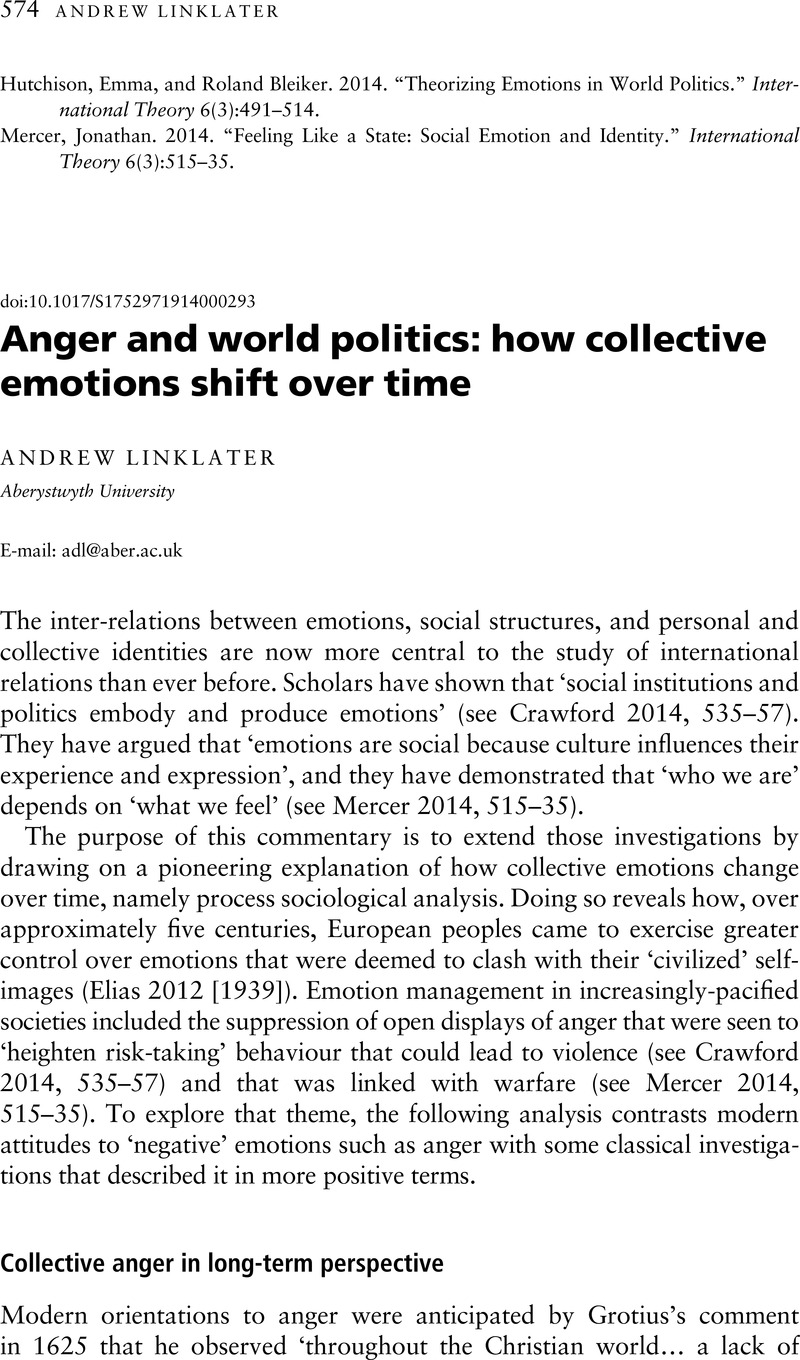Crossref Citations
This article has been cited by the following publications. This list is generated based on data provided by Crossref.
Hutchison, Emma
and
Bleiker, Roland
2014.
Theorizing emotions in world politics.
International Theory,
Vol. 6,
Issue. 3,
p.
491.
HEAD, NAOMI
2016.
A politics of empathy: Encounters with empathy in Israel and Palestine.
Review of International Studies,
Vol. 42,
Issue. 1,
p.
95.
Head, Naomi
2016.
Costly encounters of the empathic kind: a typology.
International Theory,
Vol. 8,
Issue. 1,
p.
171.
Koschut, Simon
Hall, Todd H.
Wolf, Reinhard
Solomon, Ty
Hutchison, Emma
and
Bleiker, Roland
2017.
Discourse and Emotions in International Relations.
International Studies Review,
Vol. 19,
Issue. 3,
p.
481.
Clément, Maéva
Lindemann, Thomas
and
Sangar, Eric
2017.
The “Hero‐Protector Narrative”: Manufacturing Emotional Consent for the Use of Force.
Political Psychology,
Vol. 38,
Issue. 6,
p.
991.
Cox, Lloyd
and
Wood, Steve
2017.
‘Got him’: Revenge, emotions, and the killing of Osama bin Laden.
Review of International Studies,
Vol. 43,
Issue. 1,
p.
112.
Clément, Maéva
and
Sangar, Eric
2018.
Researching Emotions in International Relations.
p.
1.
Wong, Seanon S
2018.
Mapping the Repertoire of Emotions and Their Communicative Functions in Face-to-face Diplomacy.
International Studies Review,
Sangar, Eric
Clément, Maéva
and
Lindemann, Thomas
2018.
Researching Emotions in International Relations.
p.
179.
Reinke de Buitrago, Sybille
2019.
Wie interpretieren wir: Emotionen und ihre Rolle bei der Konstruktion des (bedrohlichen) Anderen.
Zeitschrift für Politikwissenschaft,
Vol. 29,
Issue. 2,
p.
245.
Coşkun, Efser Rana
2019.
The role of emotions during the Arab Spring in Tunisia and Egypt in light of repertoires.
Globalizations,
Vol. 16,
Issue. 7,
p.
1198.
van Hoef, Yuri
and
O'Connor, Ryan
2019.
Sentimental Utility Theory: Interpreting the Utilization of Collective Emotions by the Political Elite Through the Erdoğan‐Obama Friendship.
Political Psychology,
Vol. 40,
Issue. 6,
p.
1217.
Steele, Brent J.
2019.
Restraint in International Politics.
Poets, Desirée
2020.
Curating against militarization: the politics of life in Rio de Janeiro’sMuseu da Maré.
Critical Military Studies,
Vol. 6,
Issue. 3-4,
p.
397.
Aistrope, Tim
2020.
Popular culture, the body and world politics.
European Journal of International Relations,
Vol. 26,
Issue. 1,
p.
163.
Kumral, Mehmet Akif
2020.
Exploring Emotions in Turkey-Iran Relations.
p.
1.
Benraad, Myriam
2021.
La colère, émotion révélatrice des failles et fractures de la « globalisation » ?.
Diogène,
Vol. n° 271-272,
Issue. 3,
p.
269.
Terzi, Özlem
Palm, Trineke
and
Gürkan, Seda
2021.
Introduction: emotion(al) norms in EUropean foreign policy.
Global Affairs,
Vol. 7,
Issue. 2,
p.
93.
Palm, Trineke
2021.
An emotional security community under pressure? Emotional discursive (de)legitimation in EU external border control.
Global Affairs,
Vol. 7,
Issue. 2,
p.
123.
Dawson, Grant
2021.
Classical Realism, Status, and Emotions: Understanding the Canada/Saudi Arabia Dispute and Its Implications for Global Politics.
Global Studies Quarterly,
Vol. 1,
Issue. 4,



